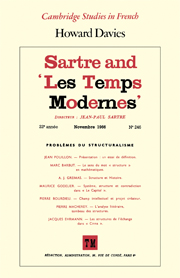Book contents
- Frontmatter
- Contents
- GENERAL EDITOR'S PREFACE
- Preface
- Acknowledgements
- Introduction
- 1 The first six years: the participation of Leiris and Lévi-Strauss
- 2 From 1951 to 1956: the rise of structuralism
- 3 Algeria: intellectual rivalries in time of war
- 4 The critique of academic knowledge
- Conclusion
- Appendix 1 Composition of the Editorial Board
- Appendix 2 Circulation figures
- Appendix 3 Categories of material to be found in Les Temps Modernes
- Appendix 4 Articles pertaining to academic anthropology
- Appendix 5 Special issues
- Notes
- Select bibliography
- Name index
- Subject index
- Cambridge Studies in French
- Frontmatter
- Contents
- GENERAL EDITOR'S PREFACE
- Preface
- Acknowledgements
- Introduction
- 1 The first six years: the participation of Leiris and Lévi-Strauss
- 2 From 1951 to 1956: the rise of structuralism
- 3 Algeria: intellectual rivalries in time of war
- 4 The critique of academic knowledge
- Conclusion
- Appendix 1 Composition of the Editorial Board
- Appendix 2 Circulation figures
- Appendix 3 Categories of material to be found in Les Temps Modernes
- Appendix 4 Articles pertaining to academic anthropology
- Appendix 5 Special issues
- Notes
- Select bibliography
- Name index
- Subject index
- Cambridge Studies in French
Summary
The origins of TM can be traced to the short-lived Resistance group Socialisme et Liberté, founded by Sartre after his release from prisoner-of-war camp in 1941. Simone de Beauvoir, Jacques-Laurent Bost, Maurice Merleau-Ponty and Jean Pouillon were members and all were to become prominent in the TM team. By 1943, Albert Camus had become associated with the group and the idea of a post-war periodical had taken shape. Specifically, its vocation was to ‘fournir à l'après-guerre une idéologic’. In the event, Camus had become too involved with Combat by 1945, and the first Editorial Board consisted of Raymond Aron, Beauvoir, Michel Leiris, Merleau-Ponty, Albert Ollivier, Jean Paulhan and Sartre.
It is likely that purchasers of TM in October 1945 had little idea of what the review would contain. The name derived, none too obviously, from Chaplin's Modern Times, and the presence of Paulhan suggested that here was a publication to take the place of the disgraced Nouvelle Revue Française. The published work of Sartre promised a specialist interest in phenomenology and literature, but whether or how this would be translated into a particular political position was hard to predict.
A statement of intent, if not a manifesto, was clearly in order. It was bound to make explicit, as Beauvoir does in her autobiography, the lessons which had been learned in the war.
- Type
- Chapter
- Information
- Sartre and 'Les Temps Modernes' , pp. 1 - 12Publisher: Cambridge University PressPrint publication year: 1987

